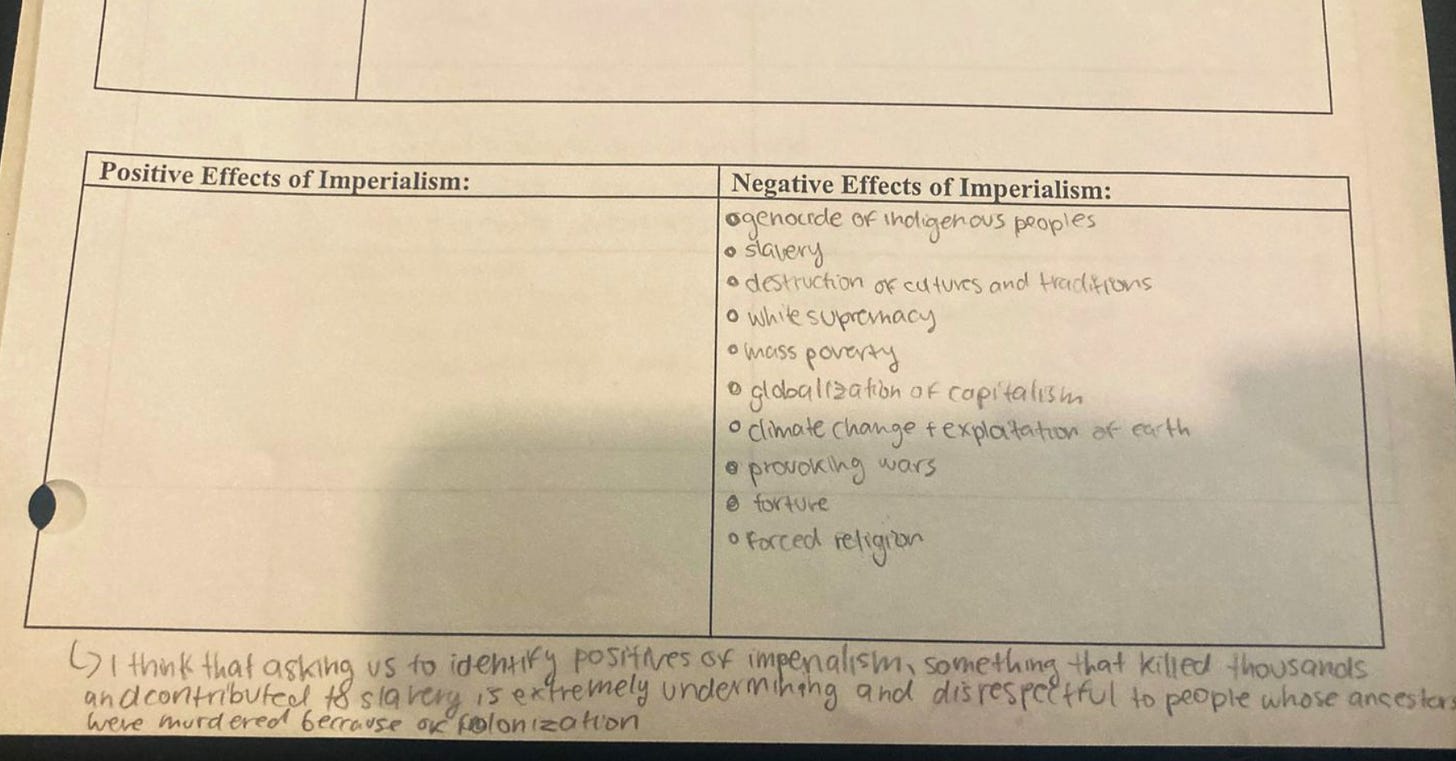Looks like we have our own little history education controversy right here in the Boston area. A worksheet distributed to students at Cambridge Rindge and Latin School asks them to assess both the “positive” and “negative effects of Imperialism.”
Interestingly, it was a high school senior who reviewed the worksheet her sister was working on and concluded that it was problematic:
Walsh snapped a photo of the assignment and uploaded it to Twitter, saying: “forcing students into the mental exercise of justifying/rationalizing genocide because of its supposed ‘positive effects’ itself perpetuates genocide and indoctrinates them into supporting an imperial war machine.” Walsh added: “this is a public high school in one of the most ‘progressive’ cities in the US — Cambridge, MA.
It’s difficult to judge how the section that was uploaded to social media by Walsh fits into the broader unit, but it is easy to see why it is concerning.
The problem with this and other assignments like it is that asking students to think about "Positive" and "Negative" effects of x often lacks historical context. The question itself undercuts careful historical inquiry.
Rather than asking this question in the abstract, I would suggest framing it around a set of primary sources that emphasizes perspective; in other words, a question that is more firmly/explicitly rooted in the evidence and multiple perspectives. [I don’t see that here, but it is possible that students are asked to analyze primary sources as part of this unit.]
What students need, for example, is a way to explore how the individuals, communities, etc., in various places that were directly impacted, assessed Imperialism as well as later generations.
Ultimately, dividing a page in half in this way as a means to assess something as complex and problematic as Imperialism doesn’t do much to help students think analytically about history. It would have been easy to pose a better, more engaging question.
In fact, posing the question in this way moves students away from the study of history altogether and into a field of landmines. Should students be asked..
What were the positive effects of slavery?
What were the positive effects of the Holocaust?
We don’t really want to go there.
Like I said at the beginning, there is a good deal we don’t know about what materials students were exposed to as part of this unit, but it does serve as an important reminder.
With all the focus on history education around the country right now, it is incumbent on teachers to ensure that their assignments and lessons adhere to sound pedagogical practices, rooted in a wide range of primary and secondary sources, that encourage students to think historically.





I teach middle school US History and when we get to Manifest Destiny we spend a couple days analyzing John Gast's "American Progress." In that assignment we draw their attention to the people groups represented in it, Anglo-Americans and Native Americans. After studying it they do write a perspective peace comparing and contrasting how the two groups would experience Westward Expansion differently. One group experiences many negative consequences while the other benefits significantly. I would never ask them to straight up identify the positives and negatives, rather we try to have them think from the perspectives of the two groups involved.
Is my approach a different version of the same question? Or is it a better way to approach the discussion? Thanks
This is one of those, "I would like to see the whole worksheet/lessons" before I can pass judgement.
I only say that because I know in the previous two states I've taught in the standards wants students to analyze arguments <i>for</i> and <i>against</i>imperialism. I typically did this through some primary sources analysis, a little Mark Twain for good measure. However, using language like "Positive" does give a reader a moment of pause. "Positive?" Were the effects really positive outside of the POV of an imperialist? If that's truly what we were going for here (naval bases, economic markets & resources) then this form of comparison should have been framed in a much better way.